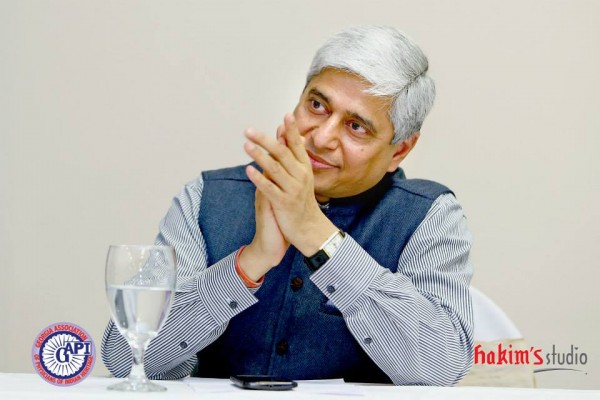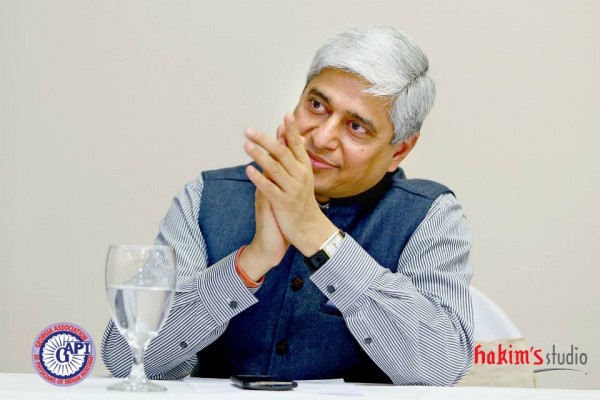BY VEENA RAO
Atlanta GA, April 7: Vikas Swarup is the best-selling author of three novels, including ‘Q & A’, which was adapted into the mega successful Oscar-winning movie, ‘Slumdog Millionaire’. He is also a diplomat currently in the news as the newly appointed spokesperson of India’s Ministry of External Affairs. Swarup is as proficient a speaker as he is a writer- skills that will serve him well in his new diplomatic role.
Between keynoting at the India Week at Emory University, and addressing two community gatherings in Atlanta, Swarup took the time to chat with local media at the Global Mall on March 19. Here are some excerpts from the conversation.
The inspiration for his first novel ‘Q & A’.
I started writing late in life, when I was posted in London between 2000 and 2003. The idea for the novel came from the popularity of the quiz show, ‘Kaun Banega Karodpati’. I’ve always been impressed with the wisdom that the man on the street has. So, the idea was to show that the greatest teacher in life is life itself. (read more about Vikas Swarup’s journey as a writer in our report here.)
Land of a billion stories.
I’ve been a diplomat since 1986- almost 29 years. I’ve been a writer only for ten of those years. I call myself a weekend writer. But now, I don’t find the time to create anything even over the weekends. All my books were written during overseas postings. Delhi is for observation and inspiration.India is the land of a billion people, which means it is the land of a billion stories. A single newspaper copy can give you plots for five or six novels!
The ‘Slumdog Millionaire’ controversy.
The criticism that ‘Slumdog Millionaire’ portrays India in a negative light does not see the larger picture- that somebody who has been given no chance in life can also overcome the odds and emerge as the winner. And that is a hopeful message.India is too large, too diverse and complex a country for any one book to represent it in its entirety. Anybody who thinks that ‘Slumdog Millionare’ is India is wrong. But slums do represent one part of India. We cannot airbrush slums out of the picture. Only when we acknowledge that slums exist can we work at improving the condition of people living there. If we say that India is only call centers and not slums, that is also an incorrect picture of India. Saying we are perfect and nothing needs to be done is not the right attitude.
No one group or country can put down a country like India. In fact, people in India celebrated the fact that ‘Slumdog’ won eight Oscars. The Parliament organized a function to felicitate the winners. The President of India organized an event. By and large there was acceptance that through this film,India has arrived on the global stage. Before ‘Slumdog’, in Hollywood they thought India is all about curries and maharajas. There was no appreciation of the creative talent there. Now, A.R. Rahman is giving music for several Hollywood productions. We get to see Anil kapoor in ‘24’, and Dev Patel in ‘The Newsroom’.
India is the flavor of the world.
I love my (day) job. This is a great time to be representing India. Now that it has emerged as a leading economy, there is hunger for news and information from India. What makes a country of 1.25 billion people tick? How are we creating this fantastic destiny for 1.25 billion people through democracy? ‘Slumdog Millionaire’ tapped into that hunger.
Sourcing stories from outside India.
Non-Indians are writing about India, so it makes little sense for Indians not to. Having said that, I must add that one of the joys of fiction writing is that the whole world is your canvas. You are not constrained by geography. You can even write about a family living in Equador. So, I don’t rule that out. As of now though, my strongest connection is with what’s happening inIndia. All three of my novels have been inspired by real life incidents in India-like the Jessica Lal case or the black buck case.
Indian literature is flourishing.
Indian fiction is breaking into new territory. Now we have genres like sci-fi, pulp, chick-lit and so on. The reader is spoilt for choices. In the past, the Indian fiction section in book stores only had five or six authors. Now it has over a 100 authors. A sign of literature flourishing in any country is that you have more and more voices.
As for the quality of writing, I agree that some filters need to be put in place. However, to the extent that that kind of writing gets people attracted to reading in the first place, and if the readers (of such material) can use that as a stepping stone to better forms of literature, then that is good. Some writers have brought lots of non-readers into mainstream readership. But it is important that readers be able to distinguish between good and bad writing. Then they can learn to appreciate the larger message of literature.
The confident Indian woman & the qualities of a CEO
Sapna Sinha, the protagonist of my third book ‘Accidental Apprentice’, represents the modern, confident Indian woman. The world is her oyster. There are no limits to her ambitions. In the past, we had kings and emperors. Now, CEOs are the kings. The net worth of Apple is more than the GDP of some small countries combined. Big corporations control everything. They can actually have consequences for the economies of small countries. I thought it would be an interesting premise to see what qualities are needed to be a CEO.
The India Week at Emory University.
India is truly emerging as the country of the future. By 2030, we will have a work force of a billion people, which is more than the work force of America and the European Union combined. And we are proving that democracy and development can go together. These reasons are compelling enough for Emory University to have an India summit. Other institutions will also follow suit.






